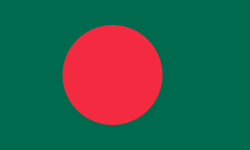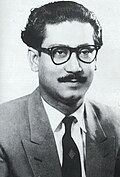| People's Republic of Bangladesh Adviser of Defence | |
|---|---|
| বাংলাদেশের প্রতিরক্ষা উপদেষ্টা | |
 | |
 | |
| Ministry of Defence | |
| Style |
|
| Type | Cabinet Minister |
| Status | Adviser |
| Member of | |
| Reports to | |
| Seat | Bangladesh Secretariat |
| Nominator | Chief Adviser of Bangladesh |
| Appointer | President of Bangladesh |
| Term length | until the next general election is held and a new Prime Minister takes office |
| Formation | 18 December 1971 |
| Salary | ৳245000 (US$2,000) per month (incl. allowances) |
| Website | mod |
The defence minister of Bangladesh heads the Ministry of Defence of the Government of Bangladesh. The post is usually held by the chief adviser of Bangladesh, who also serves as the president's second-in-command of the military. The MoD exercises supreme command authority over the Bangladesh Armed Forces. [1]








